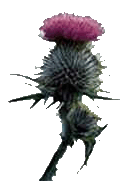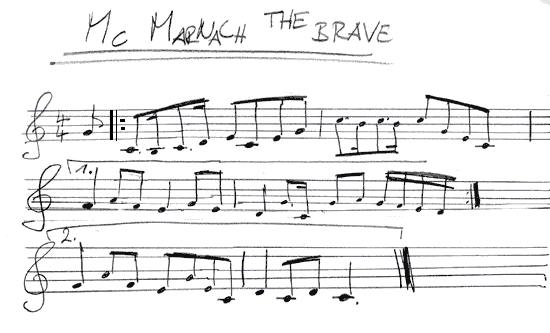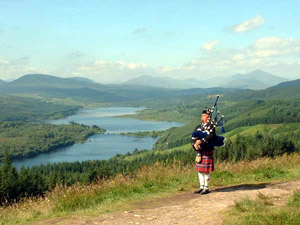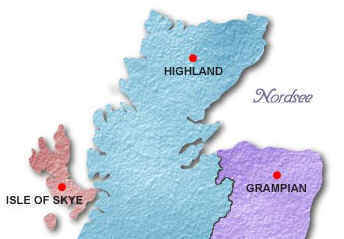Prolog:
Mein
Clan ruft an
Bleib offen für alles !
"Grundsätzlich wird bei deinen Nachforschungen am meisten heraus
kommen, wenn du versuchst, erst mal alles zu erfahren, was du erfahren
kannst. Das ist besser, als schon eine vorgefasste Meinung zu haben.
Dann besteht nämlich die Gefahr, Informationen zu übersehen, die dir
nicht in den Kram passen. So geht manches verloren, was  vielleicht
wichtig ist."
vielleicht
wichtig ist."
Dieser Rat eines Genealogen
aus Schottland, oder wie der alte Name Schottlands lautet, aus dem Königreich
Alba, ging mir durch
den Sinn, als FamilySearch mir etliche Marnachs in NO-Schottland
auflistete. Für mich hatte bisher immer festgestanden, unsere Familie
komme aus Luxemburg. Und nun dies! Waren die Luxemburger etwa nach Schottland
ausgewandert? Oder die Schotten nach Luxemburg? Wann? Warum? Oder
vielleicht eine zufällige Namensgleichheit? Ziemlich
unwahrscheinlich.
Foto: Die schottische Distel
Etwa 1470 erschien die
Distel erstmals offiziell als schottisches Emblem auf Münzen
Meine Unentschlossenheit dauerte an, bis ich eines Tages das Handy von
Christian (unser 2. Sohn, Musiker) klingeln hörte. Ich traute meinen Ohren nicht. "Scotland
the Brave"! Total entgeistert fragte ich: "Was ist das
denn???" Er grinste nur und antwortete: "Mein Clan ruft
an." ...Vielleicht war also der Gedanke an schottische Marnachs
doch nicht so abwegig? Für ihn offensichtlich nicht.

Melodie von "Scotland the Brave" in Christians
Handschrift
Der Text erzählt von Bagpipe Musik, von der Liebe zu Tälern und Hügeln
und glitzernden Flüssen der
schottischen Highlands, und dem stolzen,
tapferen Geist der Highlander.
Hark when the night is falling/ Hear! hear the pipes are calling,
Loudly and proudly calling,/
Down thro' the glen.
There where the hills are sleeping,/
Now feel the blood a-leaping,
High as the spirits of the old Highland men.
Towering in gallant fame,/
Scotland my mountain hame,
High may your proud standards gloriously wave,
Land of my high endeavour,/
Land of the shining river,
Land of my heart for ever,/
Scotland the brave.
Anmerkung zur schottischen Musik:
Dudelsäcke, die mit der traditionellen schottischen Musik in Verbindung gebracht werden, wurden vermutlich von den Römern eingeführt, die sie aus dem Nahen Osten nach Schottland brachten. Schottische Musik fällt besonders wegen der häufigen Verwendung
der Pentatonik (Fünftonleiter) auf. Die Melodien der Volkslieder sind nicht einheitlich festgelegt, und so kann es von einem einzigen Lied mehrere Hundert
Melodie- und Textvarianten geben. Weitere ausgeprägte schottische Traditionen sind der
Volkstanz und die Vielzahl mündlich überlieferter Geschichten.
(nach Encarta 98)
Viel später als
die Dinge selbst stirbt der Name der Dinge.
Ein zweiter genealogischer Rat heißt:
"Wenn du nicht weiter in die
Vergangenheit zurückgehen kannst, weil es keine Aufzeichnungen gibt, dann überlege: Aus welcher Gegend, aus welchem
Land könnte der Name ursprünglich stammen? Denn viel später als
die Dinge selbst stirbt der Name der Dinge."
Das funktioniert natürlich nur, wenn der Name nicht in ganz
Deutschland oder ganz Europa üblich ist, wie z.B. Bauer, Heinrichs,
Kraus, Miller ... Als Kind war ich über den Namen Marnach manchmal
unglücklich gewesen. Er klang zwar gut und war ziemlich einmalig, aber
kaum jemand verstand ihn gleich beim ersten Mal, und fast immer wurde er
falsch geschrieben. Er war aber auch so ungewohnt und überhaupt nicht
irgendwie abzuleiten. Jetzt hatte ich endlich mal einen Vorteil davon.
Es war ein sehr seltener Name, als Herkunftsname anfangs nur in Luxemburg und
nun auch in Schottland anzutreffen. Das gefiel mir sehr, weil unsere
ganze Familie seit langem eine Vorliebe für die Britischen Inseln,
insbesondere für die keltischen Randgebiete hat. Stefan, unser
Ältester, meinte: "Endlich weiß ich, warum. Das machen die
Gene!" Aber deshalb hieß es
jetzt, besonders vorsichtig sein, damit unser Wunschdenken uns nicht in die
Irre führte.
Who are the
Scots?
Schotten? Was sind das für Leute?
Sie sind auf keinen Fall Engländer!
The Scots are not En glish. Nor are the Scots British. No
self-respecting Englishman calls himself a Briton, neither does any
self-respecting Scot. The words Britain, Briton and British were uneasily
disinterred after a long burial as a kind of palliative to Scottish
feeling when the Parliament was merged with the English one at
Westminster. But the attempt was not successful. The best things on either
side of the Border remain obstinately English or Scottish. Are Shakespeare
and Burns British poets? When the Australians meet the United Kingdom at
that most civilised of all games that was born on the fields of England,
do they meet the “all British eleven”? And is there anyone in the
whole world who has ever asked for a British whisky and soda? The two nations of the United Kingdom have each derived from mixed
sources, racially and, as it was, historically. Each has developed strong
national characteristics which separate them in custom, habit, religion,
law and even in language. glish. Nor are the Scots British. No
self-respecting Englishman calls himself a Briton, neither does any
self-respecting Scot. The words Britain, Briton and British were uneasily
disinterred after a long burial as a kind of palliative to Scottish
feeling when the Parliament was merged with the English one at
Westminster. But the attempt was not successful. The best things on either
side of the Border remain obstinately English or Scottish. Are Shakespeare
and Burns British poets? When the Australians meet the United Kingdom at
that most civilised of all games that was born on the fields of England,
do they meet the “all British eleven”? And is there anyone in the
whole world who has ever asked for a British whisky and soda? The two nations of the United Kingdom have each derived from mixed
sources, racially and, as it was, historically. Each has developed strong
national characteristics which separate them in custom, habit, religion,
law and even in language.
The English are amongst the most amiable people in the world; they can
also be very ruthless. They have a genius for compromise, but can enforce
their idea of compromise on others with surprising efficiency. They are
generous in small matters but more cautious in big ones. The Scots are
proverbially kindly, but at first glance are not so amiable. They abhor
compromise, lean much upon logic and run much to extremes. They are
penny-wise but can be prodigally pound-foolish. They can be dour and gray,
or highly coloured and extravagant in gesture and manner.
Die 3 Ursprünge der Schotten: Kelten, Skandinavier, Pikten
"In general the nation of modern Scotland derives from three main
racial sources. The Celts, the Scandinavians or Teutons and the mysterious
and shadowy Picts. These Picts, historically speaking, were the first
inhabitants of what we now call Scotland. They were a small tough people.
They have left their strain in the blood and occasional marks in the land
and language. They were conquered by the invading Celts from Ireland who,
incidentally, were called Scots and from whom the name of the modern
nation comes.
Highlanders and Lowlanders
Two and three centuries later, however, the Celts retreated into the north-western hills and
islands, their place in the east and south lowlands being taken by the Scandinavians, Teutons and Angles. Hence the celebrated division of the Scottish people into
Highlanders and Lowlanders. It was a division which marked the distinction between
people of different culture, temperament and language.
It is from the Celts that there comes the more colourful, exciting and extravagant strain in the Scots.
The Gaelic language and song, the tartan, the bagpipes, the Highland panache, and so on. It is in the contemplation of the debasement of this lively, attractive and touching tradition in Scotland and the Scottish temperament for commercial purposes that the natives have to endure the greatest embarrassments and discomforts. their place in the east and south lowlands being taken by the Scandinavians, Teutons and Angles. Hence the celebrated division of the Scottish people into
Highlanders and Lowlanders. It was a division which marked the distinction between
people of different culture, temperament and language.
It is from the Celts that there comes the more colourful, exciting and extravagant strain in the Scots.
The Gaelic language and song, the tartan, the bagpipes, the Highland panache, and so on. It is in the contemplation of the debasement of this lively, attractive and touching tradition in Scotland and the Scottish temperament for commercial purposes that the natives have to endure the greatest embarrassments and discomforts.
It is from the Lowland strain that there comes the equally celebrated Scottish tradition of dourness, implacability and splendid courage in defence, providing a complementary virtue to the splendid Highland courage in attack. The cautious, dry, humourless, mean, red-nosed Scot is, of course, a stock figure for stage, fiction and comic picture postcard use. The legend of this alcoholic miser, the hero of all Scotch stories, has, of course, little more than the most remote origin in fact (no more indeed than has the stock, garrulous, insensitive, over-eating Englishman of some North-of-the-Border stories about their neighbours). But in so far as this admittedly highly comical, and sometimes even affectionately regarded figure, touches reality at all he derives from certain Lowland characteristics.
Schotten in Highlands and Grampian

The truth is that since the break-up of the old Highland system in the 18th century they are in Scotland all so mixed up in blood that most of them combine something of the characteristics of both Highlander and Lowlander.
A little over
two hundred years ago nearly all Scots living north and west of the Highland line which, geographically speaking, still runs diagonally across Scotland were true Celtic Highlanders. That is to say they spoke the Gaelic language, lived under the ancient Celtic system of land tenure and, of course, as members of clans, bore Highland names.
South and east of that line in the Lowland towns, villages and in the countryside, Highland names were rare."
http://www.dunbrittontours.co.uk/scots_people.html
http://www.scotland-flavour.co.uk/
< Inhalt Mein Clan ruft an
Die schottischen Clans >
| Titelseite
dieser Geschichte | Titelseite
aller Geschichten |
|
 vielleicht
wichtig ist."
vielleicht
wichtig ist."
 glish. Nor are the Scots British. No
self-respecting Englishman calls himself a Briton, neither does any
self-respecting Scot. The words Britain, Briton and British were uneasily
disinterred after a long burial as a kind of palliative to Scottish
feeling when the Parliament was merged with the English one at
Westminster. But the attempt was not successful. The best things on either
side of the Border remain obstinately English or Scottish. Are Shakespeare
and Burns British poets? When the Australians meet the United Kingdom at
that most civilised of all games that was born on the fields of England,
do they meet the “all British eleven”? And is there anyone in the
whole world who has ever asked for a British whisky and soda? The two nations of the United Kingdom have each derived from mixed
sources, racially and, as it was, historically. Each has developed strong
national characteristics which separate them in custom, habit, religion,
law and even in language.
glish. Nor are the Scots British. No
self-respecting Englishman calls himself a Briton, neither does any
self-respecting Scot. The words Britain, Briton and British were uneasily
disinterred after a long burial as a kind of palliative to Scottish
feeling when the Parliament was merged with the English one at
Westminster. But the attempt was not successful. The best things on either
side of the Border remain obstinately English or Scottish. Are Shakespeare
and Burns British poets? When the Australians meet the United Kingdom at
that most civilised of all games that was born on the fields of England,
do they meet the “all British eleven”? And is there anyone in the
whole world who has ever asked for a British whisky and soda? The two nations of the United Kingdom have each derived from mixed
sources, racially and, as it was, historically. Each has developed strong
national characteristics which separate them in custom, habit, religion,
law and even in language. their place in the east and south lowlands being taken by the Scandinavians, Teutons and Angles. Hence the celebrated division of the Scottish people into
Highlanders and Lowlanders. It was a division which marked the distinction between
people of different culture, temperament and language.
It is from the Celts that there comes the more colourful, exciting and extravagant strain in the Scots.
The Gaelic language and song, the tartan, the bagpipes, the Highland panache, and so on. It is in the contemplation of the debasement of this lively, attractive and touching tradition in Scotland and the Scottish temperament for commercial purposes that the natives have to endure the greatest embarrassments and discomforts.
their place in the east and south lowlands being taken by the Scandinavians, Teutons and Angles. Hence the celebrated division of the Scottish people into
Highlanders and Lowlanders. It was a division which marked the distinction between
people of different culture, temperament and language.
It is from the Celts that there comes the more colourful, exciting and extravagant strain in the Scots.
The Gaelic language and song, the tartan, the bagpipes, the Highland panache, and so on. It is in the contemplation of the debasement of this lively, attractive and touching tradition in Scotland and the Scottish temperament for commercial purposes that the natives have to endure the greatest embarrassments and discomforts.